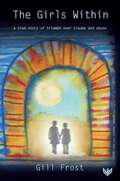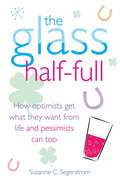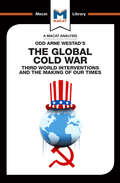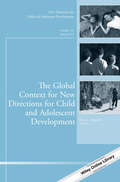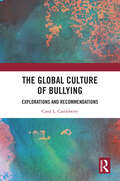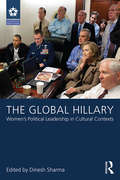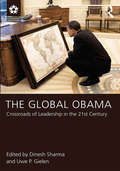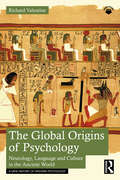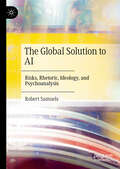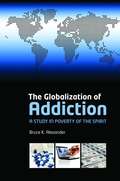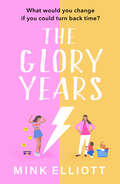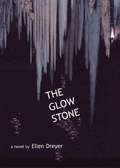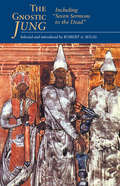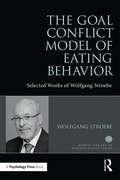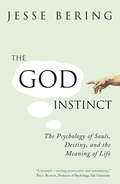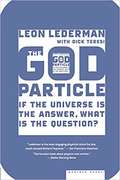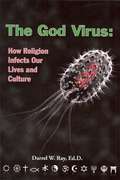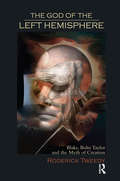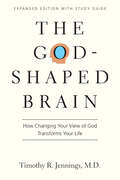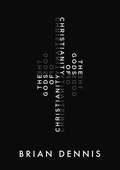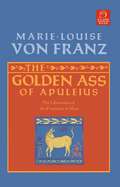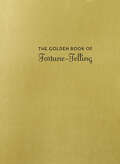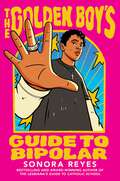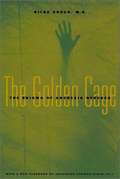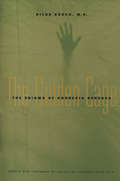- Table View
- List View
The Girls Within: A True Story of Triumph over Trauma and Abuse
by Gill FrostA compelling true story of one woman's battle with the aftermath of childhood trauma, which gives a gripping account of the often controversial and misunderstood condition of dissociative identity disorder (DID), formerly known as multiple personality disorder (MPD). This emotional but ultimately uplifting journey details the unforeseen twists and turns of the effects of therapy and how it can help in coming to terms with the past and its unsettling echoes in the present. Heartwarming and lucid, it's an inspiring tale for all to read. Through its clinical rigour, professional therapists will also gain insight into the various treatment options for DID, including the innovative use of energy therapy. The book contains 32 colour illustrations, including 24 drawings by The Girls. The star of this book is an extraordinary, bright-spirited, and entertaining six-year-old girl, called Little Vivvi, who experienced shocking abuse from members of her family. Yet Little Vivvi lives within Vivian, a middle-aged woman who has struggled with DID for many years. The challenging process of psychotherapy is laid bare, as Little Vivvi wrestles with overwhelming memories of childhood abuse. Alongside talking therapy, energy treatment, which she calls Wooshing, is utilised to astonishing effect, becoming the enigmatic ingredient that finally enables Little Vivvi to find relief from the distress and fear that had dominated her existence. As therapy seems to draw to a close, Izzy appears. A very sensitive, thoughtful and mature eight-year-old, Izzy too needs love, support and treatment to speak about her trauma. After overcoming her understandable distrust, Izzy enables an exceptional ending to the therapeutic journey, far beyond anything Vivian and her therapist, Gill, could have dreamed. Little Vivvi and Izzy will make you want to laugh out loud as well as cry. Their story teaches so much about suffering, dissociation and survival. Their aim is to enlighten, inspire and offer hope to others through reading their incredible tales, which reveal the astonishing power of The Girls within.
The Glass Half Full: How Optimists Get What They Want From Life - and Pessimists Can Too
by Suzanne C. SegerstromRose-colored glasses may look silly, but they're actually quite practical. In The Glass Half Full, psychologist Suzanne Segerstrom surveys the scientific data on optimism (including her own award-winning research) to reveal that it's not what you believe about the future that matters, but what you do about it. While pessimists debate whether their goals are attainable, optimists are out there trying to achieve them. Without insisting that you learn to "think positive," The Glass Half Full teaches you practical ways to appropriate the habits and skills that optimists use to get what they want from life. Segerstrom - who reluctantly admits her research on the topic has transformed her into an optimist -imparts the lesson with a mix of humor and intelligence that will convince even the most cynical readers that a brighter tomorrow might be just around the corner.
The Global Cold War: Third World Interventions And The Making Of Our Times
by Bryan Gibson Patrick GlennFor those who lived through the Cold War period, and for many of the historians who study it, it seemed self-evident that the critical incidents that determined its course took place in the northern hemisphere, specifically in the face-off between NATO and the Warsaw Pact in Europe. In this view, the Berlin Wall mattered more than the Ho Chi Minh Trail, and the Soviet intervention in Hungary was vastly more significant than Soviet intervention in Korea. It was only the fine balance of power in the northern theatre that redirected the attentions of the USA and the USSR elsewhere, and resulted in outbreaks of proxy warfare elsewhere in the globe - in Korea, in Vietnam and in Africa. Odd Arne Westad's triumph is to look at the history of these times through the other end of the telescope – to reconceptualize the Cold War as something that fundamentally happened in the Third World, not the First. The thesis he presents in The Global Cold War is highly creative. It upends much conventional wisdom and points out that the determining factor in the struggle was not geopolitics, but ideology – an ideology, moreover, that was heavily flavoured by elements of colonialist thinking that ought to have been alien to the mindsets of two avowedly anti-colonial superpowers. Westad's work is a fine example of the creative thinking skill of coming up with new connections and fresh solutions; it also never shies away from generating new hypotheses or redefining issues in order to see them in new ways.
The Global Context for New Directions for Child and Adolescent Development: New Directions for Child and Adolescent Development, Number 147 (J-B CAD Single Issue Child & Adolescent Development)
by Elena L. GrigorenkoTake an in depth look at the field of child and adolescent development. In this issue, the new leadership of this series offers different aspects of relevant work throughout multiple disciplines and continents, capturing both the variability and the richness of the themes considered and topics investigated in the field of childhood and adolescence. It answers: What are some of the “new” directions in the developmental sciences of childhood and adolescence? Where will the field be within the next decade or so? How do those who practice in the field’s different corners see its trajectory? This is the 147th volume in this Jossey-Bass series New Directions for Child and Adolescent Development. Its mission is to provide scientific and scholarly presentations on cutting edge issues and concepts in this subject area. Each volume focuses on a specific new direction or research topic and is edited by experts from that field.
The Global Culture of Bullying: Explorations and Recommendations
by Carol CastleberryThis book explicates “bullying” as a concept and as a social and cultural phenomenon that has become a defining reality of the times in which we live. The author begins in the arena where it is first, and most acutely individually, experienced—in school—and expands to other institutions and areas of social life—the family, the workplace, and the local, national, and international spheres, extending the concept of bullying to the global arena to uncover the social and institutional root causes of the extreme forms of bullying such as trafficking, torture, terrorism, and genocide. The book discusses the steps taken to address these issues and analyzes their efficacy. It explores the concept of epigenetics, brain development, childhood experiences, and other psychological factors that contribute to bullying behaviors and predispositions. The book investigates and compares anti-bullying and anti-violence initiatives taken particularly in the U.S, the U.K., and India to address the issue and create community-wide resilience practices. It also describes the current trends in decisions from international, regional, and domestic law, and offers evidence-based policy recommendations to establish a culture of respect for human dignity. An interdisciplinary, intercultural exploration, and analysis of the phenomenon of bullying, this book will be of interest to students, teachers, and researchers of psychology, sociology, anthropology, social justice and law, human rights, and cultural studies. It will also be useful for academic libraries, academicians, policy planners, school administration, government officials, and readers interested in reading about bullying.
The Global Hillary: Women's Political Leadership in Cultural Contexts (Leadership: Research and Practice)
by Dinesh SharmaIs there a linkage between "smart power" and Hillary Clinton's leadership style? Can she advance American leadership and women's development worldwide? The Global Hillary addresses these questions and many others. Bringing together two key aspects of Clinton’s ongoing career—her advocacy for international women’s rights and the mission to foster democratic development around the world—The Global Hillary critically analyzes Clinton’s role as a transformative leader of global influence. Essays in this collection provide insight into Clinton’s leadership style, particularly her use of American "smart power" in foreign policy, while examining her impact on the continuing worldwide struggle for women’s rights. Using international perspectives on the historical and cultural contexts of Clinton’s leadership, this book also looks toward the future of women’s political leadership in the 21st century with special attention to the prospect of electing a woman to the United States presidency.
The Global Obama: Crossroads of Leadership in the 21st Century (Leadership: Research and Practice)
by Uwe P. Gielen Dinesh SharmaThe Global Obama examines the president’s image in five continents and more than twenty countries. It is the first book to look at Barack Obama’s presidency and analyze how Obama and America are viewed by publics, governments, and political commentators around world. The author of Barack Obama in Hawaii and Indonesia: The Making of a Global President (Top 10 Black History Book) scaled the globe to gather opinions – cultural, historical, and political analyses – about Obama’s leadership style. Writers, journalists, psychologists, consultants, and social scientists present their views on Obama’s leadership, popularity, and many of the global challenges that still remain unresolved. As a progress report, this is the first book that tries to grasp ‘the Obama phenomenon’ in totality, as perceived by populations around the world with special focus on America’s leadership in the 21st Century.
The Global Origins of Psychology: Neurology, Language and Culture in the Ancient World (A New History of Western Psychology)
by Richard ValentineThis book offers a historical introduction to the remote origins of psychology, and is the first book in a series on the history of the subject. Combining a deep history approach with the study of ancient civilisations, it places psychology in a historical and global context using rigorous academic research. This book begins by separating the Greek components of psychology – psyche and logos – in order to trace their histories, separate and together, through the global Neolithic and Bronze Ages. The author develops a toolkit by deconstructing the writing of history, modern psychology, and analysis of culture, and by introducing theories from neuroscience and cultural psychology that can be tested against the data. He then takes readers on a journey back in time, from the borders of our current climatic envelope (the Holocene) towards the present, through Ancient Iraq, Egypt, Israel, and China. Each chapter deepens the reader’s understanding of psychology in its global context outside the boundaries of Western culture. In so doing, the book initiates a post-colonial re-narration showing that the story of psychology is wider and deeper than many contemporary origin stories suggest. Presented in an accessible manner, this is an excellent resource for students of psychology, philosophy, history, linguistics, archaeology, and anthropology, as well as general readers who want to learn more about the origins of this fascinating subject.
The Global Solution to AI: Risks, Rhetoric, Ideology, and Psychoanalysis
by Robert SamuelsThis book interrogates the notion that artificial intelligence may represent a threat to the world because it lacks both empathy and reason and suggests that - if we do not intervene to limit and control AI - we are at risk of being overtaken by machines, which are not aligned with human ethics and values. To outline how we should counter the worst tendencies of automated intelligence, we must first understand the roots of morality and reason and why we have been misunderstanding the fundamental difference between humans and computers. Moreover, by critiquing the rhetoric and ideology of AI proponents, we can gain a clear understanding of the need to regulate our machines on a global basis through global treaties. Turning to Freud&’s theories of empathy and reason from his Project for a Scientific Psychology, this book outlines why the human mind is different from AI, and why this difference is important to recognize.
The Globalisation of Addiction: A Study in Poverty of the Spirit
by Bruce K. AlexanderAddiction is increasing all around the world, and the conventional remedies don't work. This book presents a radical rethink about the nature of addiction. <P><P> The Globalization of Addiction argues that the cause of this failure to control addiction is that past treatments have focused too single-mindedly on the afflicted individual addict.
The Glory Years: An uplifting, hilarious page turner that will make you laugh out loud!
by Mink ElliottKate O'Reilly loves a stroll down memory lane. Nowadays she's a mother to Declan and Phoebe, has the semi-detached in suburbia and the dependable husband, Seamus – but when faced with a never-ending pile of laundry and new chin hairs sprouting overnight, no wonder she daydreams about the past. A time when the music was better (Girl Power forever!), her social circle was wider, Cool Britannia reigned supreme and only a penalty shootout stood between England reaching the finals of Euro '96. So, when a freak electrical storm takes her back in time to 1996, Kate's elated – this is her chance to discover what might have happened if she'd only done things a little bit differently in the Nineties. But as she relives her youth again, will Kate realise some things really are best left in the past? And will she ever be able to get back to the family she misses so much? Even if none of them know how to load the sodding dishwasher… A laugh-out-loud, relatable read for anyone who wishes they could take a holiday from adulting… fans of Why Mummy Drinks and Jane Fallon will love this! Previously published as A Mother Dimension, this has been extensively edited and rewritten. Readers are loving The Glory Years: 'A quick, easy and fun read that I adored…I couldn't put it down. I loved the characters and it made me laugh.' ***** Reader Review Wow!...It completely exceeded all my expectations… a lot of twists and turns throughout the book which keeps you captivated' ***** Reader Review 'I think pretty much everyone can relate to this book… I laughed out loud several times!' Reader Review '*This book had me turning pages without even realizing. *It was so good!' ***** Reader Review 'Kate was such a fun relatable character…Very nostalgic and cute! I remember so much of the blasts from the past which was fun!' ***** Reader Review 'Adorable, heartwarming and inspiring.' Reader Review 'It's such a jovial, humorous and light-hearted book… Overall a fantastic read.' Reader Review Praise for Mink Elliott: 'Nothing short of a delight… I would recommend this book if you are looking for a lighthearted and feel good read' Reader Review 'So fun to read. It reminded me of Bridget Jones' Diary (for 50 year olds!)…Highly recommend!' Reader Review 'This book had me laughing because it is so relatable and down to earth…Within the first few pages, I found myself chuckling…Highly recommend this read.' Reader Review 'Lighthearted and full of comedy…the story was relatable and enjoyable.' Reader Review 'A really easy, feel good read which is particularly relatable for those of us of a certain age!!!' Reader Review 'A brilliant, enjoyable and entertaining book that made me smile and laugh… I loved the humour and the likeable cast of characters. Highly recommended.' Reader Review 'This book was hilarious…a great way to escape for a few hours.' Reader Review
The Glow Stone
by Ellen DreyerSixteen-year-old Phoebe cannot help but wonder if she will suffer chronic depression like her mother and her recently-deceased uncle, who shared her passion for rock-collecting, until the terrifying experience of being lost in a cave provides the answer.
The Gnostic Jung: Including <Seven Sermons to the Dead> (Mythos #50)
by C.G. JungGnosticism was for C.G. jung the chief prefiguration of his analytical psychology. In this volume Robert Segal, an authority on theories of myth and Gnosticism, has searched the Jungian corpus for Jung's main discussions of this ancient form of spirituality. The progression in Gnosticism from sheer bodily existence to the release of the immaterial spark imprisoned in the body - and the reunion of that spark with the godhead - represents for Jung the psychological progression from ego consciousness to the ego's rediscovery of the unconscious, and the ego's integration with the unconscious to forge the self.Included in this volume are both Jung's sole work devoted entirely to Gnosticism, "Gnostic Symbols of the Self," and his own Gnostic myth, "Seven Sermons to the Dead." The book also contains key essays by Father Victor White and Gilles Quispel, whose "C.G. Jung und die Gnosis" is here translated for the first time. In his extensive introduction Segal discusses the parallel for Jung between ancient Gnostic and contemporary Jungian patients, the Jungian meaning of Gnostic myths and of the Seven Sermons, Jung's possible misinterpretation of Gnosticism, and the common characterization of Jung himself as a Gnostic.
The Goal Conflict Model of Eating Behavior: Selected Works of Wolfgang Stroebe (World Library of Psychologists)
by Wolfgang Professor StroebeIn the World Library of Psychologists series, international experts present career-long collections of what they judge to be their finest pieces - extracts from books, key articles, salient research findings, and their major practical theoretical contributions. In this volume: Overweight and obesity rates have increased dramatically in most industrialized countries, even though more and more people are chronically dieting. Dieters can manage to lose substantial amounts of weight while actively dieting, but most regain it within a few years. So why do most chronic dieters have such difficulty controlling their weight and why is there only a small minority of successful dieters? To address these questions, Stroebe developed the goal conflict model of eating behavior, a social cognitive theory that attributes the difficulty of chronic dieters to a conflict between two incompatible goals: eating enjoyment and weight control. Although chronic dieters are motivated to pursue their weight control goal, most fail in food-rich environments: Surrounded by palatable food cues that activate thoughts of eating enjoyment, incompatible weight control thoughts are inhibited and weight control intentions are "forgotten". For successful dieters - probably due to past success in exerting self-control - tasty high-calorie food has become associated with weight control thoughts. For them, exposure to palatable food makes weight control thoughts more accessible, enabling them to control their body weight in food-rich environments. This book contains the key articles of a research program by Stroebe and collaborators to assess the validity of this theory. They succeeded in tracing the processes that lead from temptation to a breakdown of dieting intentions. They also demonstrated that these theoretical principles can be used to develop effective weight loss interventions. The book should be of value for all researcgers, students and clinicians involved in obesity research and treatment.
The God Instinct: The Psychology of Souls, Destiny and the Meaning of Life
by Jesse BeringThe God Instinct explores how people's everyday thoughts, behaviours and emotions betray an innate tendency to reason as though God were deeply invested in their public lives and secret affairs.In this entertaining and thought-provoking book, Jesse Bering unravels the evolutionary mystery of why we grapple for meaning, purpose and destiny in life. He argues that God is not merely an idea to be entertained or discarded based on the evidence. Nor is God a cultural invention, an existential band-aid, an opiate of the masses. Instead, Bering proposes, God is a way of thinking - one that evolved through our ancestors, millions of years ago, to keep us in check and give us the edge on our competitors.While a belief in higher forces may seem ridiculous to some, The God Instinct shows that it is hardwired into our genetic make-up, and carries with it massive evolutionary benefits.
The God Particle: If the Universe Is the Answer, What Is the Question?
by Leon Lederman with Dick TeresiDid you know that the most creative companies have centralized bathrooms? That brainstorming meetings are a terrible idea? That the color blue can help you double your creative output? From the New York Times best-selling author of How We Decide comes a sparkling and revelatory look at the new science of creativity. Shattering the myth of muses, higher powers, even creative "types," Jonah Lehrer demonstrates that creativity is not a single gift possessed by the lucky few. It's a variety of distinct thought processes that we can all learn to use more effectively. Lehrer reveals the importance of embracing the rut, thinking like a child, daydreaming productively, and adopting an outsider's perspective (travel helps). He unveils the optimal mix of old and new partners in any creative collaboration, and explains why criticism is essential to the process. Then he zooms out to show how we can make our neighborhoods more vibrant, our companies more productive, and our schools more effective.You'll learn about Bob Dylan's writing habits and the drug addictions of poets. You'll meet a Manhattan bartender who thinks like a chemist, and an autistic surfer who invented an entirely new surfing move. You'll see why Elizabethan England experienced a creative explosion, and how Pixar's office space is designed to spark the next big leap in animation. Collapsing the layers separating the neuron from the finished symphony, Imagine reveals the deep inventiveness of the human mind, and its essential role in our increasingly complex world.
The God Virus: How Religion Infects Our Lives and Culture
by Darrel W. RayThe author explores this and much more in his book The God Virus: How Religion Infects Our Lives and Culture. This second-generation book takes the reader several steps beyond previous offerings and into the realm of the personal and emotional mechanisms that affect anyone who lives in a culture steeped in religion.
The God of the Left Hemisphere: Blake, Bolte Taylor and the Myth of Creation
by Roderick TweedyThe God of the Left Hemisphere explores the remarkable connections between the activities and functions of the human brain that writer William Blake termed 'Urizen' and the powerful complex of rationalising and ordering processes which modern neuroscience identifies as 'left hemisphere' brain activity. The book argues that Blake's profound understanding of the human brain is finding surprising corroboration in recent neuroscientific discoveries, such as those of the influential Harvard neuro-anatomist Jill Bolte Taylor, and it explores Blake's provocative supposition that the emergence of these rationalising, law-making, and 'limiting' activities within the human brain has been recorded in the earliest Creation texts, such as the Hebrew Bible, Plato's Timaeus, and the Norse sagas. Blake's prescient insight into the nature and origins of this dominant force within the brain allows him to radically reinterpret the psychological basis of the entity usually referred to in these texts as 'God'. The book draws in particular on the work of Bolte Taylor, whose study in this area is having a profound impact on how we understand mental activity and processes.
The God-Shaped Brain: How Changing Your View of God Transforms Your Life
by Timothy R. JenningsWhat you believe about God actually changes your brain. Brain research in neuroscience has found that our thoughts and beliefs affect our physical, mental, and spiritual health. Mind and body are interrelated, and we are designed for healthy relationships of love and trust. When we understand God as good and loving, we flourish. Unfortunately, many of us have distorted images of God and mostly think of him in fearful, punitive ways. This leads us into unhealthy patterns of self-defeating behaviors and toxic relationships. But our lives can change when God renews our minds with a truer picture of him. Psychiatrist Tim Jennings unveils how our brains and bodies thrive when we have a healthy understanding of who God is. He dispels common misconceptions about God and shows how different God concepts affect the brain differently. Our brains can adapt, change, and rewire with redeemed thinking that frees us from unnecessary pain and suffering. Discover how neuroscience and Scripture come together to bring healing and transformation to our lives. This expanded edition now includes a study guide for individual reflection or group discussion, with questions for learning from Scripture, science and nature, and experience.
The Gods of Christianity
by Brian DennisThe fact that surprisingly few Christians actually know and experience the mighty God we preach about, teach about, and sing about is evidenced by the abundance of doubt, worry, and fear that permeate our lives. It is evidenced by the lack of faith and power exemplified in our Churches. It is evidenced by the ordinary lives we live while claiming to be children of the most high God. The resulting inconsistencies between the things we boldly profess and the things we commonly practice have unfortunately become accepted as normal Christian behavior. We no longer expect anything more--not from our own lives, not from the Church, not even from God Himself.This lack of expectancy, this lack of faith in the faithfulness of God clearly indicates a distinct difference between the God we preach and the God we have personally come to know. It reveals that we do not know the very God we proclaim. We do not know the God of the Bible; for if we knew Him, the Church would indeed be an eminent light shining in the darkness, a city set on a hill, an indelible force against which the powers of this present evil world could not prevail.The God we do know, however, the God with whom so many Christians have become familiar, unfortunately, allows us to live comfortably in the weakness of our complacency and blatant disbelief. We live far below the high calling that Christ has placed upon His Church. We walk in ways that deny the very power and authority that belong to the children of God. We do not live by faith. Sadly, we have learned to live in such a way as to where there is no distinguishable difference between the lives of those who claim to know Christ and the lives of those who do not--no distinguishable difference between the Church and the world.The good news is that the truth remains. The God of the Bible is still there. He can do no other than prove Himself faithful to those who hunger and thirst after righteousness--to those who hear His voice and obey. Yes, to those who would yet have a heart to know Him, He is there to be known. We must first, however, lay aside all notions of the small God we have come to know and we must dare to see Him as He is if we are to rise above the routine of cultural Christianity and walk in the truth of knowing Christ.
The Golden Ass of Apuleius: The Liberation of the Feminine in Man
by Marie-Louise von Franz"Today there is much discussion of the liberation of women," writes Marie-Louise von Franz, "but it is sometimes overlooked that this can only succeed if there is a change in men as well. Just as women have to overcome the patriarchal tyrant in their own souls, men have to liberate and differentiate their inner femininity. Only then will a better relationship of the sexes be possible." It is this timely theme that Dr. von Franz explores in her psychological study of a classic work of the second century, The Golden Ass by Apuleius of Madaura. The novel recounts the adventures of a young Roman who is transformed into an ass and eventually finds spiritual renewal through initiation into the Isis mysteries. With its many tales within a tale (including the celebrated story of Psyche and Eros), the text as interpreted by Dr. von Franz is a rich source of insights, anecdotes, and scholarly amplification.
The Golden Book of Fortune-Telling (Fortune-Telling)
by K.C. JonesA compendium of fun and entertaining ways to understand your future, taken from entries in the bestselling Fortune-Telling series.In this book lie the answers to your future. Reveal the meanings of your name, birthday, zodiac sign, and dreams. Unveil the significance of your color choices, friendships, and love interests. Discover what is foretold, learn to read auspicious omens, and divine the gift of attracting good fortune. Consult The Golden Book of Fortune-Telling and uncover the wisdom of the ages—and the power to shape your destiny.
The Golden Boy's Guide to Bipolar
by Sonora Reyes"This is Sonora Reyes at their absolute best." — Aiden Thomas, New York Times bestselling author of Cemetery BoysFrom bestselling author Sonora Reyes comes a poignant and searingly honest companion novel to the multi-award-winning The Lesbiana’s Guide to Catholic School, following beloved character Cesar Flores as he comes to terms with his sexuality, his new bipolar diagnosis, and more mistakes than he can count. Seventeen-year-old Cesar Flores is finally ready to win back his ex-boyfriend. Since breaking up with Jamal in a last-ditch effort to stay in the closet, he’s come out to Mami, his sister, Yami, and their friends, taken his meds faithfully, and gotten his therapist’s blessing to reunite with Jamal.Everything would be perfect if it weren’t for The Thoughts—the ones that won’t let all his Catholic guilt and internalizations stay buried where he wants them. The louder they become, the more Cesar is once again convinced that he doesn't deserve someone like Jamal—or anyone really.Cesar can hide a fair amount of shame behind jokes and his “gifted” reputation, but when a manic episode makes his inner turmoil impossible to hide, he’s faced with a stark choice: burn every bridge he has left or, worse—ask for help. But is the mortifying vulnerability of being loved by the people he’s hurt the most a risk he’s willing to take?
The Golden Cage: The Enigma Of Anorexia Nervosa
by Catherine Steiner-Adair Hilde BruchFirst published more than twenty years ago, with almost 150,000 copies sold, The Golden Cage is still the classic book on anorexia nervosa, for patients, parents, mental health trainees, and senior therapists alike. Writing in direct, jargon-free style, often quoting her patients' descriptions of their own experience of illness and recovery, Bruch describes the relentless pursuit of thinness and the search for superiority in self-denial that characterizes anorexia nervosa. She emphasizes the importance of early diagnosis and offers guidance on danger signs. Little-known when this groundbreaking book was first published, eating disorders have become all too familiar. Sympathetic and astute, The Golden Cage now speaks to a new generation.
The Golden Cage: The Enigma of Anorexia Nervosa, With a New Foreword by Catherine Steiner-Adair, Ed.D.
by Hilde BruchFirst published more than twenty years ago, with almost 150,000 copies sold, The Golden Cage is still the classic book on anorexia nervosa, for patients, parents, mental health trainees, and senior therapists alike. Writing in direct, jargon-free style, often quoting her patients’ descriptions of their own experience of illness and recovery, Hilde Bruch describes the relentless pursuit of thinness and the search for superiority in self-denial that characterizes anorexia nervosa. She emphasizes the importance of early diagnosis and offers guidance on danger signs. Little-known when this groundbreaking book was first published, eating disorders have become all too familiar. Sympathetic and astute, The Golden Cage now speaks to a new generation.
